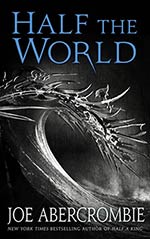
![]() Nymeria
Nymeria
6/6/2015
![]()
Once more, reading this second volume of Joe Abercrombie's Shattered Sea Trilogy, I've found myself wondering how it came to be marketed as YA, since it's quite deeper and more thoughtful than the usual YA fare - even taking into account my bias against this sub-genre. Of course the main characters are younger people set on a coming-of-age journey, and there is some romance involved, yet these factors can't be enough, in my opinion, to apply that label... My own musings aside, this middle book in the trilogy is even better than the first one, and it promises to lead toward a compelling and gripping finale.
The author himself gives a sort of summary for the story with these words:
Sometimes a girl is touched by mother war.
Sometimes a woman becomes a warrior.
Sometimes a warrior becomes a weapon.
And weapons are made for one purpose.
Indeed one of the main characters here is Thorn Bathu, a young woman who prefers learning the art of sword-fighting rather than her culture's more acceptable womanly crafts: having killed another trainee by tragic accident she's condemned to death and rescued by Yarvi, the protagonist of Half a King, now become Father Yarvi, minister to the King of Gettland. He sees something special in this rough-edged, short-tempered girl and enrolls her for his mission to seek allies against the High King's encroaching rule. Yarvi's motley crew of misfits, among whom there are a few familiar faces from the previous book, also includes young Brand, another warrior in training who failed his goal by trying "to do good", to be honest and straightforward.
Brand is somehow Thorn's polar opposite: steadfast and grounded in common good sense, he does not hold a high opinion of himself and seeks in the brotherhood of warriors the family he never had. Unlike Thorn he's not looking for glory or payback for the wrongs, real or imagined, life inflicted on him; all he wants is to belong, and of the two he's the more inclined to dreams or flights of fancy. There is a sort of role reversal here: Thorn is the one with the more aggressive personality, with the temper that can flare at the slightest provocation, while Brand tries - and more often than not fails - to use diplomacy in the attempt to defuse situations.
These two young people's journey on the South Wind does not entail only travel to far-away lands where we readers learn more about this world, and into unforeseen dangers, it's also a journey of discovery: of themselves and their potential, of the bonds that can be forged by shared toil and dangers, of the unexpected ways one can grow - physically as well as mentally. What's unsurprising is that this growth is encouraged (and exploited) by Yarvi who knows quite well how such an experience can change an individual's outlook and mind-set. In a way the story runs on parallel tracks to Yarvi's own in the previous book, even though it must be stressed that it's far from a carbon copy: if some of the elements look the same - a sea journey and a group of ill-assorted companions, the painful effort of rowing a ship, the uncomfortable, sometimes brutal living conditions - the tale develops along different lines, mostly because in the first book the characters were somehow finding their way as they went, while here one can perceive Yarvi's subtle direction, his long-term planning, his willingness to employ every means at his disposal to reach his goal.
Father Yarvi's "deep cunning" is quoted often by various characters (maybe as a hint for the younger audience the book should be aimed at?) but the reminder is hardly necessary: his behind-the-scenes work can be felt all along, like the careful weaving of a spider's web being spun under our eyes. He's a very different person from the one we left at the end of Half a King, where he had lost all of his boyish naiveté to become something of a manipulator: now he appears as the advocate of peace, as a mediator, but it's soon clear it's all a cover (and a thin one, at that) for his peculiar brand of morality and ruthless political maneuvering. A kind of maneuvering that does not balk at using people, changing them into the weapons he needs for the protection of his land.
That's exactly what happens with Thorn, whose fighting skills are sharpened through relentless practice - as an aside I'd like to mention the wonderful character of Skifr, the older woman who instructs Thorn in the fighting arts and does so in the most unusual way and with some very outlandish techniques: I loved Skifr for her amazing blend of wisdom and snarky humor, mystery and common good sense and for her unabashed, loud-mouthed brashness. Her teachings transform Thorn from an ineffective fighter moved by blind, unfocused rage, into a finely honed warrior gifted with flawless instincts. Exactly what Yarvi needed to carry out his plans. Abercrombie pulls no punches where Thorn is concerned, and all too often I found myself cringing at the amount of physical injury the character goes through, and yet this is indeed one of the author's trademarks as far as female characters are concerned: the heroine needs not be stunningly beautiful and alluring to make an impression, since the sheer strength of her personality is enough to make her stand out. Thorn and Skifr (but not just them) are a fine example of this, the former as a battle-scarred warrior, the latter as an older, wise woman proudly wearing the ravages of time as a badge of honor. It's a very refreshing attitude, and one of the reasons I enjoy reading this author's works so much.
With these premises, I'm fairly certain that the third and final volume of this trilogy will be more than worth the wait.
http://spaceandsorcery.wordpress.com